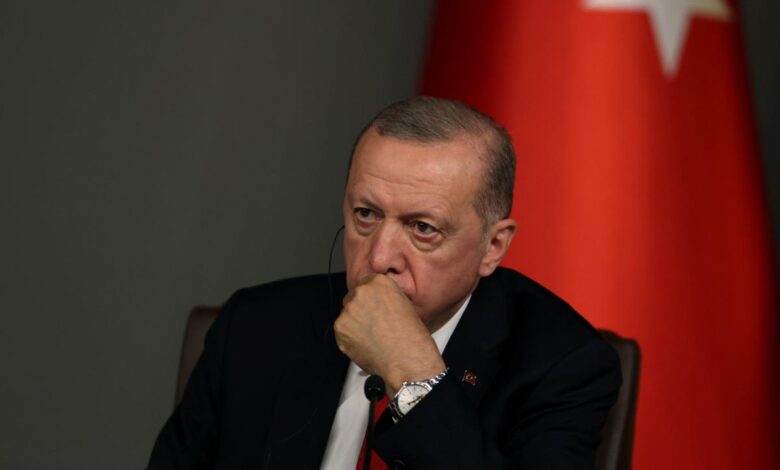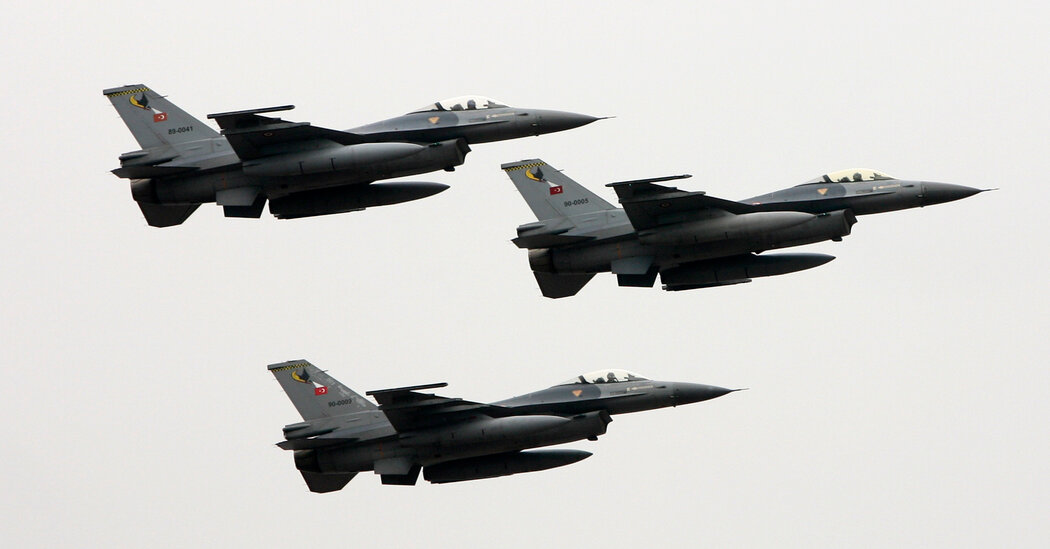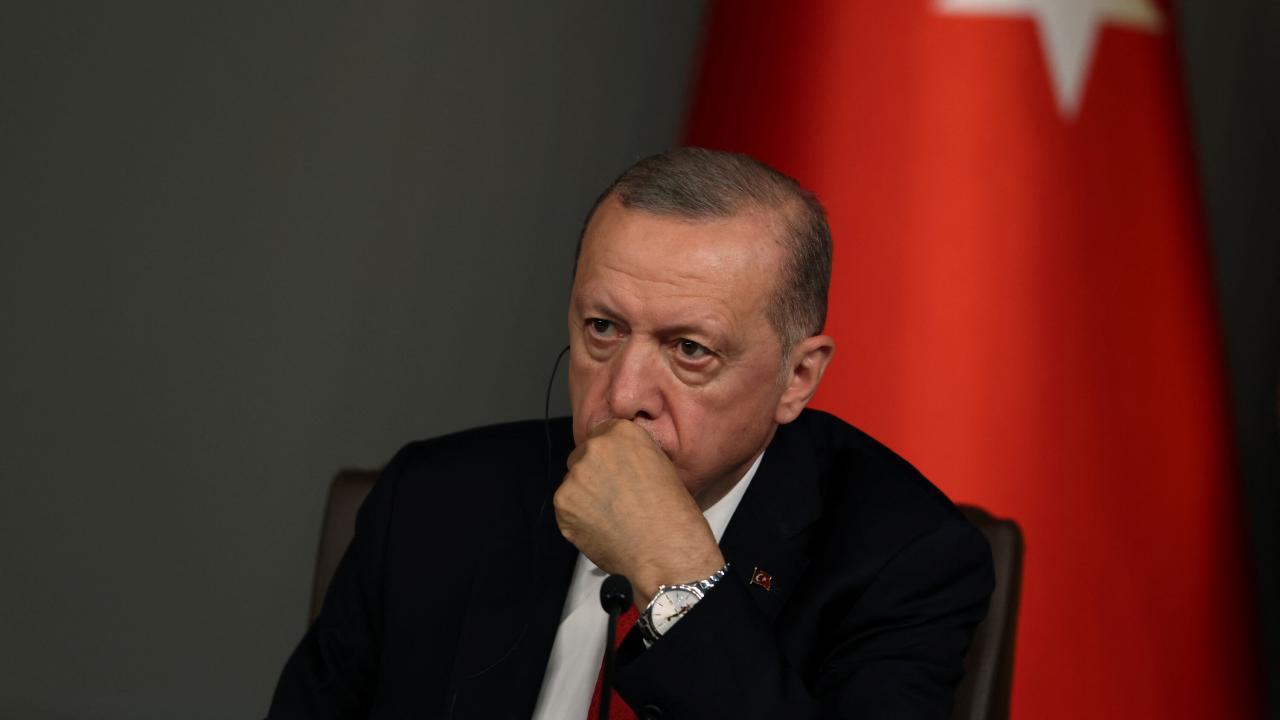
Biden Approves F-16 Sale to Turkey After Erdogan Backs Swedens NATO Bid
Biden to move forward with sale of f 16 jets to turkey after erdogan greenlights swedens nato bid – Biden Approves F-16 Sale to Turkey After Erdogan Backs Sweden’s NATO Bid – a move that has sparked international debate. The US President’s decision to greenlight the sale of F-16 fighter jets to Turkey comes after Turkish President Recep Tayyip Erdogan finally gave his approval for Sweden’s NATO membership.
This seemingly straightforward exchange, however, carries significant implications for regional security, US-Turkey relations, and the future of NATO itself.
For years, Turkey has sought to acquire new F-16s, citing the need to modernize its air force and strengthen its defense capabilities. However, the US Congress had been hesitant to approve the sale due to concerns about Turkey’s human rights record and its acquisition of Russian S-400 missile systems.
Erdogan’s decision to lift his objections to Sweden’s NATO bid, after months of delays and negotiations, appears to have tipped the scales in favor of the F-16 deal.
The F-16 Deal
The recent agreement between the United States and Turkey regarding the sale of F-16 fighter jets has been a long time coming, marking a significant shift in the relationship between the two NATO allies. This deal comes after years of tension and strained relations, primarily due to Turkey’s purchase of Russian S-400 missile systems, which led to US sanctions and the suspension of Turkey’s participation in the F-35 fighter jet program.
Background and Context of Turkey’s Request for F-16 Fighter Jets
Turkey’s interest in acquiring F-16 fighter jets dates back to the 1980s. The country has a long history of reliance on US-made military equipment, and the F-16s were seen as a crucial component of its air defense capabilities. Turkey’s desire for these jets is rooted in several factors:
- Modernization of Air Force:Turkey’s existing fleet of F-16s, acquired in the 1980s and 1990s, was becoming increasingly outdated and in need of modernization. The new F-16s would provide a significant upgrade in terms of technology, capabilities, and overall effectiveness.
- Regional Security Concerns:Turkey faces a number of security challenges in its region, including threats from Kurdish separatists, terrorist groups, and neighboring countries. The F-16s would enhance Turkey’s ability to respond to these threats and project power in the region.
- NATO Membership:As a member of NATO, Turkey is committed to maintaining a strong military force that can contribute to the alliance’s collective defense. The F-16s would help Turkey fulfill this commitment and demonstrate its commitment to NATO.
Timeline of Key Events
The path to the recent agreement has been long and complex, marked by a series of negotiations, disagreements, and political considerations:
- 2017:Turkey requests the purchase of F-35 fighter jets from the United States, but its simultaneous purchase of Russian S-400 missile systems raises concerns about compatibility and security risks.
- 2019:The US suspends Turkey’s participation in the F-35 program due to the S-400 purchase, citing concerns about the potential for Russia to gain access to sensitive technology.
- 2020:Turkey is formally removed from the F-35 program, and the US imposes sanctions on Turkish officials involved in the S-400 purchase.
- 2022:Turkey expresses renewed interest in acquiring F-16 fighter jets, but the US remains hesitant due to the unresolved S-400 issue.
- 2023:Turkey and Sweden reach an agreement that paves the way for Sweden’s NATO membership. This development, coupled with the need for Turkey to strengthen its air defenses in the face of growing regional tensions, leads to a breakthrough in negotiations over the F-16 deal.
Erdogan’s Greenlight for Sweden’s NATO Bid

Turkey’s approval of Sweden’s NATO membership marks a significant turning point in the expansion of the North Atlantic Treaty Organization (NATO). This decision, after months of negotiations and political maneuvering, paves the way for Sweden’s formal entry into the alliance, bolstering its collective defense capabilities and reinforcing its commitment to transatlantic security.
The Conditions for Approval
Turkey’s approval of Sweden’s NATO membership was not without its conditions. Ankara had previously expressed concerns over Sweden’s alleged support for Kurdish groups that Turkey considers terrorist organizations, and its perceived laxity in extraditing individuals sought by Turkey. To address these concerns, Sweden made significant concessions, including:
- Commitment to Counterterrorism:Sweden pledged to strengthen its cooperation with Turkey in combating terrorism, including by taking steps to address Turkey’s concerns about Kurdish groups. This commitment includes the extradition of individuals sought by Turkey, as well as a commitment to combat the flow of arms and funds to these groups.
The Biden administration is moving forward with the sale of F-16 jets to Turkey after President Erdoğan finally gave the green light to Sweden’s NATO bid. This development comes as the US faces a flurry of political drama with the news that former President Trump is suggesting he will be arrested next week, as reported in this article.
Whether the F-16 deal will be affected by the escalating political tension remains to be seen, but it’s clear that the international landscape is becoming increasingly complex.
- Arms Exports:Sweden agreed to lift its arms export restrictions on Turkey, paving the way for potential future sales of Swedish military equipment.
- Extradition of Individuals:Sweden agreed to consider Turkey’s extradition requests on a case-by-case basis, taking into account legal and judicial processes.
These concessions demonstrate the importance of addressing Turkey’s security concerns to secure its support for Sweden’s NATO membership.
The Impact on NATO’s Expansion
Turkey’s greenlight for Sweden’s NATO bid signifies a major step forward in the alliance’s expansion, particularly in the context of the ongoing conflict in Ukraine. The addition of Sweden, a militarily capable and technologically advanced nation, further strengthens NATO’s collective defense posture and enhances its ability to deter potential adversaries.
Sweden’s membership also reinforces the alliance’s commitment to the principles of collective security and territorial integrity, sending a clear message of solidarity and deterrence. This is particularly relevant in the context of Russia’s ongoing aggression against Ukraine and its increasing assertiveness in the region.
The Biden Administration’s Decision

The Biden administration’s decision to move forward with the F-16 sale to Turkey was a complex one, influenced by a confluence of factors, including the need to strengthen NATO unity, the potential benefits for US defense industry and jobs, and the desire to maintain a constructive relationship with Turkey.
Factors Influencing the Decision
The decision to approve the sale was influenced by a number of factors, including:
- NATO Unity:Turkey’s approval of Sweden’s NATO membership was a key factor in the decision. The Biden administration saw the sale as a way to strengthen NATO unity and demonstrate support for Turkey’s role in the alliance.
- US Defense Industry:The F-16 sale is expected to generate billions of dollars in revenue for the US defense industry, creating jobs and boosting the economy.
- US-Turkey Relations:The sale was also seen as a way to improve relations between the US and Turkey, which have been strained in recent years over issues such as Turkey’s purchase of Russian S-400 missile systems.
Potential Benefits and Drawbacks for the US
The F-16 sale to Turkey presents both potential benefits and drawbacks for the US.
Potential Benefits
- Strengthened NATO Unity:The sale is seen as a way to strengthen NATO unity and demonstrate support for Turkey’s role in the alliance. A strong NATO is crucial for deterring Russian aggression and promoting security in Europe.
- Economic Benefits:The sale is expected to generate billions of dollars in revenue for the US defense industry, creating jobs and boosting the economy. This economic benefit is particularly important in the current economic climate.
- Improved US-Turkey Relations:The sale is seen as a way to improve relations between the US and Turkey, which have been strained in recent years over issues such as Turkey’s purchase of Russian S-400 missile systems. Improved relations would allow for greater cooperation on issues of mutual interest, such as counterterrorism and regional stability.
Potential Drawbacks
- Human Rights Concerns:Turkey’s human rights record has been a source of concern for the US. The sale could be seen as condoning Turkey’s human rights abuses, which could damage US credibility and reputation.
- Potential for F-16s to be Used Against US Allies:There are concerns that Turkey could use the F-16s against US allies in the region, such as Greece and Cyprus. This could lead to increased tensions and instability in the region.
- Increased Turkish Influence in the Region:The sale could increase Turkey’s influence in the region, which could be seen as a negative development by some US allies.
Implications for US-Turkey Relations
The F-16 sale is likely to have a significant impact on US-Turkey relations.
- Improved Relations:The sale is likely to improve relations between the US and Turkey, as it demonstrates a willingness to cooperate and work together. This could lead to greater cooperation on issues of mutual interest, such as counterterrorism and regional stability.
- Reduced Tensions:The sale could help to reduce tensions between the US and Turkey, which have been strained in recent years over issues such as Turkey’s purchase of Russian S-400 missile systems. This could lead to a more stable and predictable relationship between the two countries.
- Strengthened Strategic Partnership:The sale could help to strengthen the strategic partnership between the US and Turkey. This would be beneficial for both countries, as it would allow them to work together more effectively on issues of mutual interest.
The Impact on Regional Security
The sale of F-16 fighter jets to Turkey has significant implications for regional security dynamics, particularly in the Eastern Mediterranean and the Middle East. This decision comes amidst a complex geopolitical landscape, with Turkey playing a pivotal role in various regional conflicts and alliances.
Turkey’s Enhanced Military Capabilities
The acquisition of advanced F-16 fighter jets will significantly enhance Turkey’s military capabilities. These aircraft possess superior air-to-air combat capabilities, advanced avionics, and precision strike capabilities. Turkey’s strengthened air power will undoubtedly impact its regional influence and its ability to project power in the Eastern Mediterranean and beyond.
Implications for Turkey’s Role in the Region
The F-16 sale will likely embolden Turkey’s assertive foreign policy, particularly in areas where it has territorial disputes or competing interests with neighboring countries. Turkey’s increased military might could lead to a more assertive posture in the Eastern Mediterranean, potentially impacting maritime security and energy resources in the region.
Potential Consequences for Relations with Neighbors
The F-16 sale could strain relations between Turkey and its neighbors, particularly Greece and Cyprus. These countries have long-standing disputes with Turkey over territorial waters, airspace, and energy resources in the Eastern Mediterranean. The acquisition of advanced fighter jets could escalate tensions and lead to a more militarized environment in the region.
It’s a busy week for international relations, with the US moving forward with the sale of F-16 jets to Turkey after Erdogan finally gave the green light to Sweden’s NATO bid. Meanwhile, back home, Wells Fargo is warning customers of potential issues with their accounts, urging them to verify their balances and report any discrepancies.
Hopefully, these developments will lead to a more stable and secure global landscape, both domestically and internationally.
International Reactions: Biden To Move Forward With Sale Of F 16 Jets To Turkey After Erdogan Greenlights Swedens Nato Bid
The decision to sell F-16 fighter jets to Turkey and to allow Sweden’s entry into NATO has generated a mixed response from the international community. While some countries have welcomed the developments, others have expressed concerns, highlighting the potential for both increased cooperation and heightened tensions.
Reactions to the F-16 Sale
The sale of F-16 fighter jets to Turkey has been met with a range of reactions.
The Biden administration’s decision to move forward with the sale of F-16 jets to Turkey after Erdogan’s approval of Sweden’s NATO bid is a significant development in the region. This move comes amidst a complex geopolitical landscape, further complicated by the federal reserve’s key inflation gauge unexpectedly coming in hotter.
This unexpected spike in inflation could impact the global economy and potentially influence the US’s foreign policy decisions, including the F-16 sale to Turkey.
- Supportersargue that the sale will strengthen Turkey’s defense capabilities and contribute to regional stability. They believe that a modernized Turkish air force will enhance NATO’s collective security posture and deter potential threats. The US has also emphasized that the sale is subject to strict conditions, including commitments to human rights and non-use against NATO allies.
- Criticsexpress concerns about Turkey’s human rights record and its recent military actions in Syria and Libya. They argue that the sale could empower Turkey to further its aggressive foreign policy objectives, potentially destabilizing the region. Additionally, there are concerns about Turkey’s potential use of F-16s against Kurdish forces in Syria, which could further escalate tensions in the region.
Reactions to Sweden’s NATO Bid
Sweden’s accession to NATO has been met with largely positive reactions.
- Supporterssee Sweden’s entry as a significant boost to NATO’s defense capabilities and a demonstration of its commitment to collective security. Sweden’s advanced military technology, its strong intelligence capabilities, and its geographic location in the Baltic Sea region are seen as valuable assets for the alliance.
- Critics, primarily in Russia, express concerns about the expansion of NATO’s presence in Northern Europe. They view Sweden’s accession as a provocative move that could increase tensions and lead to a new arms race in the region.
Potential for International Tensions and Cooperation, Biden to move forward with sale of f 16 jets to turkey after erdogan greenlights swedens nato bid
The F-16 sale and Sweden’s NATO bid have the potential to both increase international tensions and foster greater cooperation.
- Increased tensionscould arise from Turkey’s potential use of F-16s against Kurdish forces in Syria, further escalating an already complex conflict. Additionally, Russia’s concerns about NATO expansion could lead to increased military activity in the Baltic Sea region, raising the risk of unintended escalation.
- Greater cooperationcould result from Turkey’s strengthened military capabilities, which could contribute to NATO’s collective security posture. Sweden’s accession to NATO could also lead to increased cooperation in areas like intelligence sharing and defense planning, further strengthening the alliance’s capabilities.
Implications for Global Security
The decisions regarding the F-16 sale and Sweden’s NATO bid have significant implications for global security.
- Potential for conflict: The F-16 sale and Sweden’s NATO bid could potentially escalate tensions in the region, particularly in the context of Turkey’s ongoing conflict with Kurdish forces in Syria. Russia’s concerns about NATO expansion could also lead to increased military activity in the Baltic Sea region, raising the risk of unintended escalation.
- Strengthened deterrence: The F-16 sale and Sweden’s NATO bid could also contribute to stronger deterrence against potential adversaries. A modernized Turkish air force and Sweden’s advanced military capabilities would enhance NATO’s collective security posture, making it more difficult for potential aggressors to act.
- Shifting alliances: The decisions could also lead to shifts in alliances and regional dynamics. Turkey’s closer ties with NATO, despite concerns about its human rights record, could potentially lead to a realignment of regional security partnerships.
The Future of US-Turkey Relations

The recent greenlight for Sweden’s NATO bid by Turkey, coupled with the potential F-16 sale, could signal a turning point in US-Turkey relations. While historical tensions and disagreements persist, these developments present opportunities for improved cooperation and a strengthened partnership.
Potential for Improved Relations
The F-16 sale could act as a catalyst for improved relations. It demonstrates a willingness on the part of the US to address Turkey’s security concerns and re-establish trust. The sale also provides Turkey with advanced fighter jets, enhancing its military capabilities and contributing to regional security.
Moreover, the successful resolution of the NATO expansion issue could foster a more collaborative environment between the two countries, paving the way for cooperation on other shared interests.
Challenges and Opportunities for Cooperation
Despite the potential for improvement, several challenges remain. These include:
- Differing perspectives on regional conflicts:Turkey’s involvement in Syria and its support for the Syrian opposition have created friction with the US, which prioritizes stability in the region.
- Turkey’s purchase of Russian S-400 missile systems:This decision angered the US, which imposed sanctions on Turkey and led to the suspension of F-35 deliveries. The issue remains a point of contention.
- Human rights concerns:The US has expressed concerns about Turkey’s human rights record, particularly following the 2016 coup attempt. These concerns could hinder cooperation on issues like democracy and rule of law.
Despite these challenges, there are opportunities for cooperation:
- Counterterrorism:Turkey and the US share a common interest in combating terrorism, particularly from groups like ISIS.
- Energy security:Turkey’s strategic location makes it a key player in energy security in the region. The US can collaborate with Turkey on diversifying energy sources and reducing dependence on Russia.
- Economic cooperation:The US and Turkey have strong economic ties. Cooperation on trade and investment could boost both economies.
Future Trajectory of the US-Turkey Partnership
The future of US-Turkey relations hinges on the ability of both countries to manage their differences while focusing on shared interests. The F-16 sale and Sweden’s NATO membership could serve as a foundation for a more constructive relationship. However, continued dialogue and commitment to addressing concerns will be crucial.
The partnership could potentially evolve into a more balanced and mutually beneficial one, characterized by greater cooperation on shared priorities.
Conclusive Thoughts
The F-16 sale to Turkey, coupled with Sweden’s impending NATO membership, marks a significant shift in the geopolitical landscape of the region. The deal highlights the complex web of interests and challenges facing the US and its allies, and underscores the delicate balancing act required to maintain stability in a volatile world.
The implications of this decision will be felt for years to come, as it sets a precedent for future negotiations and underscores the interconnected nature of global security.






